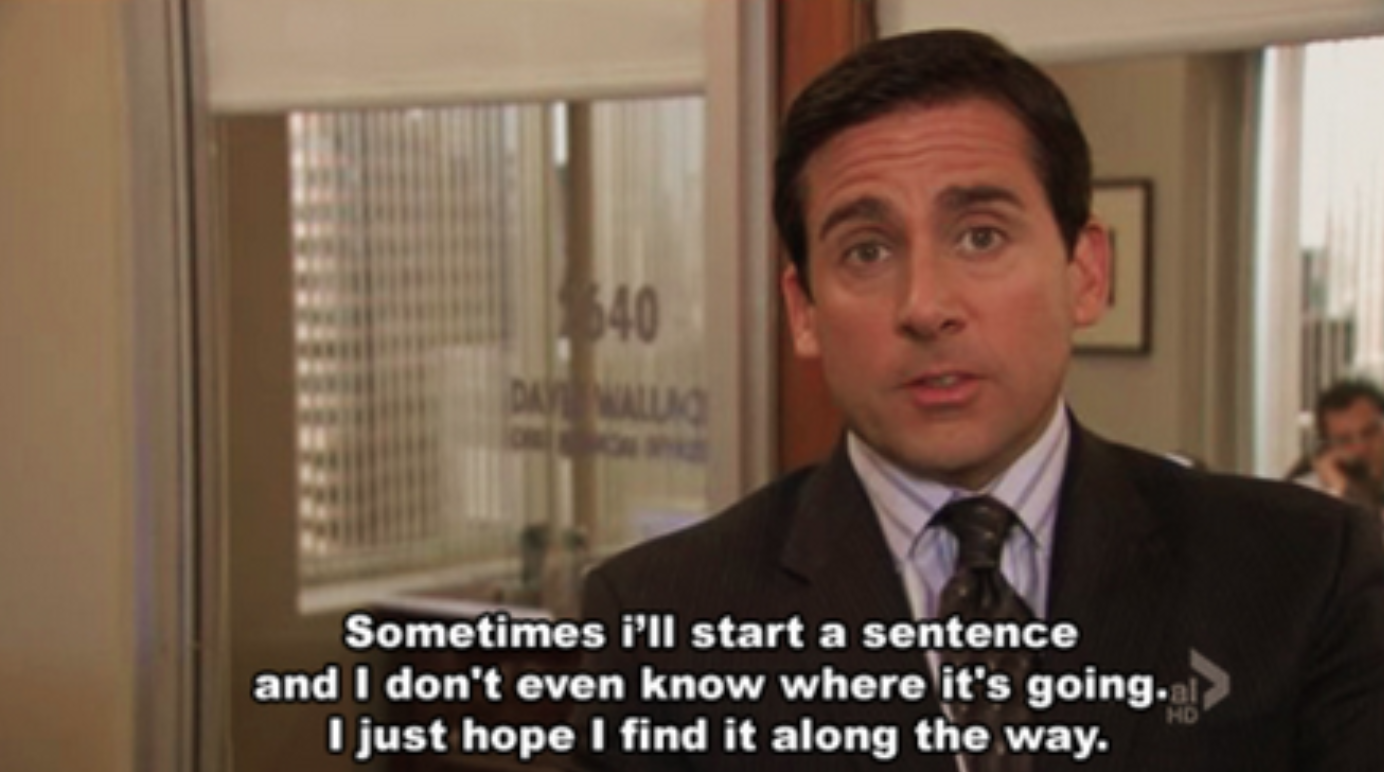If “Tell me about yourself” is the very first question in your interview, it’s a filler question.
If that’s the first question in your interview, chances are, the interviewer hasn’t looked at your resume, is buying time to find a relevant question to ask, or is trying to break the ice.
Trust me, no one is looking for or expecting you to have an earth shattering answer.
However, it doesn’t mean it’s not an important question. This first answer sets the tone for your interview. Your answer won’t win the interview, but it can lose it.
1. Avoid the Life Story
Yes, your life story is unique, but this first question during a job interview is not asking for it.
If a candidate starts with, “So I was born in Maryland…” that’s a red flag. There’s no need to literally start from the beginning of your life.
These types of answers often include overly personal details about overcoming challenging circumstances. Use your discretion whether it’s relevant or appropriate to bring these up as the first thing you tell a stranger in a job interview.
Personal details that provide context to your professional interests and experiences are fine, but for sensitive details, ask yourself if they highlight pertinent work experience or if you’re using them to score points with the interviewer. At worst, candidates use these very real, but delicate stories to emotionally manipulate the interviewer.
Anyway! Keep your story up beat and focus on highlighting your relevant work experiences.
2. Avoid the Rabbit Hole Story
Even if you have a work project that perfectly showcases why you’re the perfect fit for the job, resist the urge to dive deep into the details.
If you have a “hero story” that encapsulates why you’re qualified, just tell two or three impressive results. Don’t go into how you achieved those results.
For the “tell me about yourself’ question, if you start talking about how you did something versus what you achieved, you’re probably going to start rambling. You’ll talk about details like what software tools you used, how long things took, team personnel challenges — all things that the interviewer didn’t ask to hear about.
If you say something the interviewer wants to hear more about, they’ll ask. Don’t try to read the interviewer’s mind. The tendency is to overload on the details in hopes one of them is what the interviewer wants to hear. No one is successful with this approach.
3. Avoid self-glorification
Factually state your achievements without your commentary on how you want the interviewer to perceive them. This type of posturing commentary sounds insincere and arrogant. Here are illustrative examples I’ve heard:
I’m an experienced, passionate business leader and inventor. I drive my team to be innovative and get results.
I’ve mastered the craft of business development. I’ve really seen it all and have done every kind of deal imaginable.
These statements might be true, but they’re off-putting, especially when said out loud. This is the kind of language you often find in people’s LinkedIn descriptions or cover letters. It’s filler. No one is impressed.
Focus on showing how you exemplify these types of statements with real results you’ve achieved instead of telling the interviewer what you want them to say about you.
3 Tips for Answering “Tell me about yourself”
✅ Keep it to 3 minutes or less
Keep your answer short. If you already have a stock answer you’ve been using, record yourself saying it out. Make sure it’s 3 minutes or less.
3 minutes of continuous talking is longer than you think, especially if you’re the one listening. Mention the highlights, generally, 2–3 examples are enough. Your interviewer will ask you for more details if they’re interested.
✅ Focus on tangible work items you did, not your team
Say things like,
At [Company X], I ran the email marketing campaigns to get more users for Y product.
At [Company X], I created the financial model for our quarterly revenue targets.
At [Company X], I was the product manager for the new user onboarding experience for Z product.
Don’t say “when I was in business development at [Company Z], we were focused on revenue deals.” Say how you contributed, not the mandate of the team.
✅ Highlight notable career transitions
Bring up different roles you’ve held if they show you have relevant experience from a different perspective.
Explicitly say how the different role helped you be a better fit for the role you’re going after. Let’s say you’re going after a product marketing role, you could say something like,
Before [Company Y] at [Company X], I was in customer service. I used to answer 100 tickets a day resolving customer issues. This experience helped me develop empathy for users. I learned how to put myself in the user’s shoes, which has helped me write better product value propositions that resonate with users.
Make sure to explicitly highlight how your different experience relates to a core function of the role you’re interviewing for. This is a good strategy to show you have relevant experience when you haven’t held the exact title of the role you’re going after or a way to strengthen limited years of experience.
Ready to get a job in tech?
I’ve outlined step by step strategies to get the job you want in tech and included the EXACT resume I used to get a job at Dropbox.
Click here to get the resume that got me the job at Dropbox!
